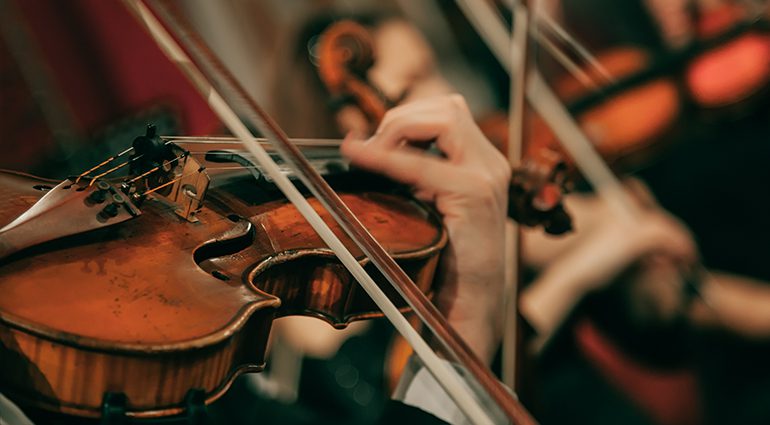
While the expiry date of current chart songs is getting shorter and shorter, many of the classical works from the pen of famous composers can hardly be surpassed in terms of longevity. These classical masterpieces are in demand with uninterrupted popularity, reason enough to cast our eyes and ears on some wonderful works and their composers. Here is just a small selection of timeless pieces from the huge pool of the Classical music repertoire. ️🎼
1. Johann Sebastian Bach: Brandenburg Concerts
If you first do a hell of a job and then get neither a fee nor a job, and the works are not even performed, then something has gone down the drain. This is exactly what happened to Johann Sebastian Bach with the “Brandenburg Concerts” that he composed for Margrave Christian Ludwig of Brandenburg. Obviously, the congenial composer was way ahead of his baroque times. After all, these epochal compositions are now some of Bach’s greatest masterpieces.
You are currently viewing a placeholder content from YouTube. To access the actual content, click the button below. Please note that doing so will share data with third-party providers.
2. Georg Friedrich Handel: The Messiah
In the days of the long-standing legendary composers, it was not uncommon for people to be neglected during their lifetime. Handel, on the other hand, was able to enjoy his fame during his lifetime, was successful in England and world-famous. “The Messiah” comes from his creative mind, a work that is devoted to a religious theme in three parts: the Savior. Anyone who even remotely listens will be impressed by the virtuoso complexity and the simplicity of the composition. Handel wanted to compose without barriers. He wanted the audience to understand his message. And he must have been a real speedy finger and quick-thinking source of ideas. He only needed a record-breaking 24 days for the monumental work “The Messiah”.
3. Sergei Rachmaninoff: Piano Concerto No. 3 in D minor
The Oscar-winning movie classic “Shine” (1996 – dr. Scott Hicks) tells the story of the pianist David Helfgott, who spent several years in mental hospitals due to a schizo-affective disorder. Although the disease cannot be completely cured, he regains his strength and triumphantly returns to the stage as a former child prodigy. Legendary score track in this cinematic melodrama is the 3rd piano concerto by Sergei Rachmaninoff; the virtuoso had composed the concerto with such a high degree of difficulty and spectacular passages that it was considered unplayable.
You are currently viewing a placeholder content from YouTube. To access the actual content, click the button below. Please note that doing so will share data with third-party providers.
4. Antonio Vivaldi: Four Seasons
Vivaldi’s “Four Seasons” reflect the natural course of the year; and so the work then also consists of four concertos. The Venetian composer uses unconventional stylistic devices. He imitates the singing and twittering of birds and does not stop at the musical implementation of a thunderstorm and a snow storm. He entangles this in a complexity that caused a sensation in the Baroque era and which has made the Four Seasons one of the most frequently performed works of the Baroque to this day. A wonderful piece for the musical treasure chest.
You are currently viewing a placeholder content from YouTube. To access the actual content, click the button below. Please note that doing so will share data with third-party providers.
5. Joseph Haydn: London Symphonies
The fact that Haydn was Beethoven’s teacher and Mozart’s friend already gives a small impression of his skills and importance. In fact, he was a composer with an incredible output. In view of the more than 100 symphonies from his pen, one might believe that he supplied musical assembly line goods. As is well known, that was not the case, instead it got better and better. Nevertheless, his creativity and perfectionism only seemed really fueled when he was able to go on a journey after being fired. He wrote his last symphonies in London. And these “London symphonies”, especially Nos. 99-104, are described by the professional world as the highlights of his work.
You are currently viewing a placeholder content from YouTube. To access the actual content, click the button below. Please note that doing so will share data with third-party providers.
6. Bedřich (Friedrich) Smetana: The Moldau
“Die Moldau” (Vltava) is the most famous piece by the Czech composer Bedřich Smetana. It comes from the symphonic cycle “My Fatherland” and sets to music in a unique way the course of the river of the same name, the largest river in the Czech Republic, which is also known as the “Bohemian Sea”. Smetana puts images of nature into sounds and “Die Moldau” has long since become a kind of substitute national anthem in the Czech Republic. By the way: when Smetana gave the complex work the light of day in 1874, he was already completely deaf himself!
You are currently viewing a placeholder content from YouTube. To access the actual content, click the button below. Please note that doing so will share data with third-party providers.
7. Gustav Mahler: The Song of the Earth
“Das Lied von der Erde” by Gustav Mahler is particularly characterized by its unique formal design. The sequence of movements is based on the symphony, weighty turns emphasize the sonata form based on the stanza structure. The lightening from C minor to C major follows the principle of increasing up to the final movement. Interesting in this context: Mahler placed the highest demands on the musicians in his top-class works – including the “Lied von der Erde” (Song of the Earth). And in doing so, he explored the limits of various symphonic genres. Gustav Mahler died 110 years ago.
You are currently viewing a placeholder content from YouTube. To access the actual content, click the button below. Please note that doing so will share data with third-party providers.
8. Franz Schubert: Winter Journey
Franz Schubert paints a gloomy picture in his piece “Winterreise”, which he composed in 1827. In a gloomy tone, he tells the story of an ending love and the sad path of the despised. The gruesome songs were anything but mainstream at the time, many of the contemporary listeners were frightened by the impressively celebrated sadness. Schubert created the work a year before his death. And so the Winterreise is understood by current performers as a musical image of the path of man to his grave.
9. Wolfgang Amadeus Mozart: A Little Night Music
It is still unclear how many movements Mozart’s serenade “Eine kleine Nachtmusik” originally had. There are five movements in Mozart’s catalog raisonné; unfortunately the second phrase is missing. It is not known whether the pages were deliberately removed. It may also be that they have been lost or forgotten. The classic rumor mill continues to simmer. In any case, the serenade is a musical masterpiece and in itself as complex as a symphony. And it is beautiful.
You are currently viewing a placeholder content from YouTube. To access the actual content, click the button below. Please note that doing so will share data with third-party providers.
10. Ludwig van Beethoven: Joy, Beautiful Sparks of the Gods
A very special version of the Ninth Symphony was sold by the London auction house “Sotheby’s” in 2003 for a whopping three million euros. Beethoven had once again corrected the 575 pages of its large symphony. He was angry at how poorly the copyists had deciphered his handwriting. So Beethoven’s angry remarks are immortalized in this copy of his work; Sighs that the master simply wrote on the edge of the sheet music. One of the most famous pieces, of course, is “Joy, Beautiful Spark of the Gods”. After all, the set version of Friedrich Schiller’s “Ode to Joy” is one of the most played pieces in the world and since 1985 the hymn of the European Union, which at that time was still called the European Community.
You are currently viewing a placeholder content from YouTube. To access the actual content, click the button below. Please note that doing so will share data with third-party providers.
Which classical piece, or classical composer, is your favorite? Let us know with a comment!
One comment
Leave a Reply
You are currently viewing a placeholder content from Facebook. To access the actual content, click the button below. Please note that doing so will share data with third-party providers.
More InformationYou are currently viewing a placeholder content from Instagram. To access the actual content, click the button below. Please note that doing so will share data with third-party providers.
More InformationYou are currently viewing a placeholder content from X. To access the actual content, click the button below. Please note that doing so will share data with third-party providers.
More Information





Mikhalis Makroulakis says:
Very predictable! Not so exciting!…..